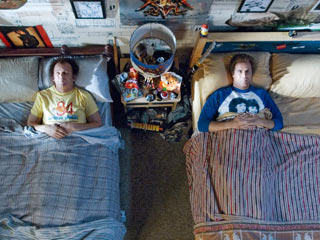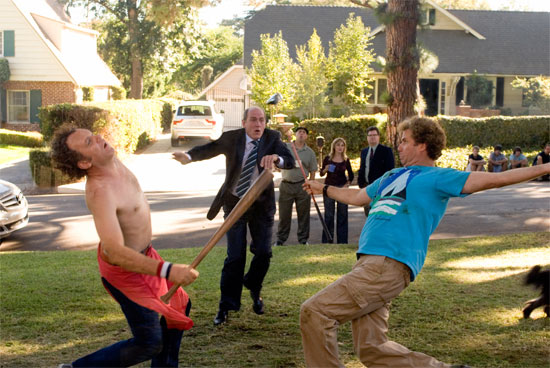I thought I knew funny, but I was mistaken. Before the blessed light of Step Brothers entered my life, I knew not the sweet comedic splendors of live burial, bunk-bed catastrophe or a minivan family singing Sweet Child O' Mine in four-part harmony.
Will Ferrell plays Brennan and John C. Reilly is Dale, two unemployed full-grown manboys who each live with a widowed single parent. Brennan mooches off mom Nancy, Dale off dad Robert.
When Nancy and Robert get  married, their live-in sons become stepbrothers, and lo, the foreheads of the world's comedy writers did submit to a mighty thwacking as their owners begged the gods of japery, "Why didn't I think of that?" There hasn't been this much fun under the same roof since the creation of the Bureau of Alcohol, Tobacco and Firearms.
married, their live-in sons become stepbrothers, and lo, the foreheads of the world's comedy writers did submit to a mighty thwacking as their owners begged the gods of japery, "Why didn't I think of that?" There hasn't been this much fun under the same roof since the creation of the Bureau of Alcohol, Tobacco and Firearms.
Instead of banging the same gong throughout, though, the writing team of Ferrell, Reilly and director Adam McKay, who is maybe the second hottest comedy helmer after Judd Apatow, keeps trying new situations.
The boys are alternately sworn foes, BFFs and even sober job-holding adults. The only standing order comes from Reilly: "We're here to f - - k s - - t up!" Proclaim it, sir! Step Brothers is, by a hair, the funniest film I've seen in this year (watched it in 2009), and at least as funny as McKay's other ones, "Anchorman" and "Talladega Nights."
After fooling with night-vision goggles, one of the manboys says, "Imagine if we'd had these when we were 12." "Even better," is the reply. "We got them when we're 40!" The concept of grown men acting like boys has been done so frequently that it's nearly time for a shock-value comedy about grown men acting like grown men. But it has rarely been done properly, with the correct degree of vulgarity, social awkwardness, scowly faced mystery, aggression and Bruce Lee T-shirts. Boys are freaks. Picture Tom Hanks in a de-cornified "Big": Wouldn't his first move have been a mission for porn and beer?
There is fascination with pretty ladies, but a fog of unease when it comes to talking to them. There is much fighting - Brennan hits Dale with a bike - and the soft crackling of old bones as geezers are lightly tossed down flights of stairs. At a moment of détente, Brennan offers Dale the chance to ride with him upon "majestic and translucent steeds," while Dale responds, "I will follow you through the mists of Avalon." Brennan wants to sing, but he's t oo shy to perform, so Dale encourages him: "Your voice - it's like a combination of Fergie and Jesus."
oo shy to perform, so Dale encourages him: "Your voice - it's like a combination of Fergie and Jesus."
Brennan's rich brother Derek (language sampler: "Bro," "Not gonna happen," and "It would be kickass"), who brags that he knows Jeff Probst, becomes a hilarious foil as played by Adam Scott, who has been popping up here and there for a few years but never made his mark before. Now he's hit on a role that can pay his wages for the next decade: He's not just a tool, but a power tool.
There is too much funny here for a movie (even though it continues into the closing credits). Step Brothers should be a TV show. Given the limited career aspirations of its main characters, the demotion would be fitting.
Labels: Movie Review
If Michael Bay were a strip club, he'd be one of those high-class joints where all the gorgeous girls work, dancing to two-minute R&B songs while offering top-shelf champagne and primo lap dances, but never letting you do anything more than touch. If Neveldine & Taylor were a strip club, they'd be the small, cramped room with blaring rock music, one pole in the middle of the floor, a bar that pours only watered-down Tequila shots and a stage full of skanks who'll do anything for $50. They're both essentially about the same stuff -- hot chicks, violent action, pounding music and snappy visuals -- but one leaves you feeling quasi-classy and satisfied where the other leav es you feeling like a dirty, degenerate scumbag.
es you feeling like a dirty, degenerate scumbag.
Gamer is a film that's simultaneously criticizing and targeting its audience: videogamers. It predicts a future where violence and sex are so glorified that the only thing that can sate society's collective id is seeing convicts kill each other for sport. In this future, videogamers are either upper class brats or disgusting slobs, neither of which have any sense of morality. Neveldine and Taylor aren't the first to put forward this idea, of course—remember Death Race? Well you probably wont be surprised that this movie isn't any better.
In the future, where exposition seems to be a part of every nightly newscast, buildings are covered with poorly Photshopped billboards and exploding fire text. Pay-per-view is still a reliable business model. Everyone uses Minority Report-style computers. Second Life and World of Warcraft have been replaced by remote controlled humans who look like they were dressed in a Spencers. Amidst all this chaos is the leading convict-slave-superstar: Kable. He's well on his way to winning his freedom, and everyone's super excited about it.
Unfortunately, just giving a character a wife and splicing in some quick flashbacks to imply some sort of frame-up or mystery doesn't make him three-dimensional. Kable, played adequately by Gerard Butler, is just another gruff action hero out to get his wife back. That's fine, especially in a movie that's supposed to be a throwback to the good old days of action flicks, except that the action is indecipherable.
Neveldine and Taylor have the potential to among the most creative action directors in the industry—they operate the camera on rollerblades, swing it from the ceiling, and employ any number of interesting angles and pans—except that their films are edited with the pace of a hummingbird heart. Gamer's primary selling point is the action, but the film insta ntly becomes a mess of explosions, quick zooms, video glitches, and slow motion. I understand that they were trying to recreate something like the Gears of War games on XBox 360, but what's missing is a cohesive point of view. The film is an assault on the eyes. Gamer may have failed to level-up in the story department, but it looks extremely good on a technical level. Most of the effects and stunts were done practically, and the HUD overlays during the game footage are believable enough (although way too confusing for any actual videogamer to use).
ntly becomes a mess of explosions, quick zooms, video glitches, and slow motion. I understand that they were trying to recreate something like the Gears of War games on XBox 360, but what's missing is a cohesive point of view. The film is an assault on the eyes. Gamer may have failed to level-up in the story department, but it looks extremely good on a technical level. Most of the effects and stunts were done practically, and the HUD overlays during the game footage are believable enough (although way too confusing for any actual videogamer to use).FAMOUS LAST WORDS
Gamer is one of those interesting juxtapositions of positive and negative. Clearly, Gamer is a bad movie. It's filled with a stupid plot reflecting today's society, less than exemplary acting, and enough editing cuts to cause an aneurysm. I watched it, knew it was bad, knew it was derivative, and knew it was a highly polished turd; yet somehow Gamer does something right, give actual gamers a bad name.
Labels: Movie Review
In its amiable, quiet, PG-13 way, The Invention of Lying is a remarkably radical comedy. It opens with a series of funny, relentlessly logical episodes in a world where everyone always tells the truth, and then slips in the implication that religion is possible only in a world that has the ability to lie. Then it wraps all of this into a sweet love story.
The screenplay is filled with hysterical one liners and acerbic barbs, but the greatest achievement might be its disquietingly full-throttle satire on religion. Gervais and Robinson have shrewdly implied that in a world without lies there is no religion, an d they use a mix of broad and subtle comedy to build on this interesting idea. The scene in which Gervais writes down the equivalent of the 10 Commandments is played for guffaws because he's doing it on pizza boxes, but a sequence in which he has to explain said rules is filled with a probing style of humor that takes no prisoners.
d they use a mix of broad and subtle comedy to build on this interesting idea. The scene in which Gervais writes down the equivalent of the 10 Commandments is played for guffaws because he's doing it on pizza boxes, but a sequence in which he has to explain said rules is filled with a probing style of humor that takes no prisoners.
The Invention of Lying also has dramatic ambitions, but its fulfillment of these is a little less consistent. There is a beautiful moment in which Gervais creates the idea of heaven and eternal paradise to quell his dying mother's terror, but some of the romantic stuff with Jennifer Garner is less successful. The two have a reasonable chemistry and their first date at the start is uproarious, but the love subplot never feels as inventive or satisfying as the rest of the project. It's a very formulaic addition to an otherwise refreshing comic gambit, and the finale looks lifted out of the dreariest rom-com possible. Still it's the only genuine narrative slip-up, and by that juncture the movie has already established itself as an entertaining use of your time.
I saw the movie with my brother, who laughed a lot. I have no idea what he thought of its implications. The Invention of Lying isn't strident, ideological or argumentative; it's simply the story of a guy trying to comfort his mother and perhaps win the woman he loves. Gervais, who co-directed and co-wrote with Matthew Robinson, walks a delicate tightrope above hazardous chasms.
He's helped greatly in his balancing act by Garner's inspired, seemingly effortless, performance as a great beauty who isn't conceited or cruel but simply thinks Mark, with his pug nose, is the wrong genetic match for her children. She plans to marry Brad, who is as conventionally handsome (and boring) as Clark Kent. The film has one of those scenes at the altar ("Do you, Brad, agree to stay with Anna as long as you can?") that avoids obvious cliches by involving profound philosophical conclusions.
FAMOUS LAST WORDS
Yeah, the romance doesn't fully work and it is aesthetically a bit bland. Still I've already discussed these and made it clear they don't prevent The Invention of Lying from representing a fun way to spend 99 minutes.It's a solid comedy with a superlative central concept and ultimately I regret not having gone to see it and doing my bit to stop it from flopping.
Labels: Movie Review
